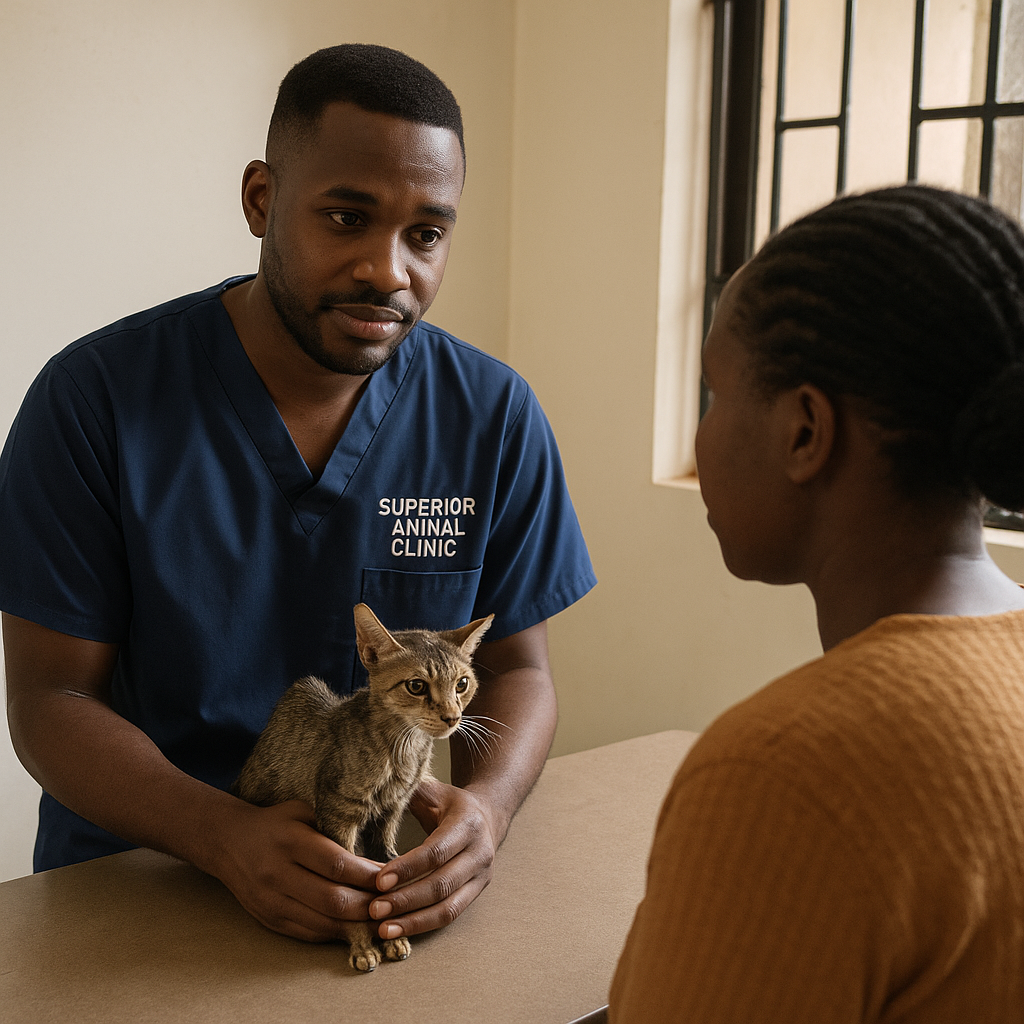
Last month, a worried pet owner from Muyonyo rushed into Superior Animal Clinic in Makindye with her beloved cat, Mimi. Mimi had stopped eating, was sneezing nonstop, and had watery eyes. The owner had tried home remedies, but nothing worked. After a quick examination, we diagnosed Mimi with cat flu, started treatment right away, and within a week she was back to her playful, purring self.
Stories like Mimi’s are common in Kampala. Cats in neighborhoods like Old Kampala, Katwe, Muyenga, Bugolobi, and Kololo are often brought in for flu, parasites, skin infections, dental problems, or more serious conditions like Feline Infectious Peritonitis (FIP). Many times, cat owners only realize their pet is sick when symptoms become severe — because cats are experts at hiding illness.
That’s why it’s important to know the most common cat diseases in Kampala, their symptoms, causes, prevention methods, and treatment options. Whether you’re searching for “a cat doctor near me in Kampala,” “the best veterinary clinic for cats Uganda,” or “how to treat a sick cat in Kampala,” this guide is for you.
At Superior Animal Clinic, located in Makindye along Salaama Road, we’ve helped countless cat owners from Nsambya, Kasubi, Zana, Nakasero, Buziga, Munyonyo, Rubaga, Lugogo, Lubowa, Seguku, Ndejje, Bukoto, Bulindo, Kulambiro, and beyond keep their cats healthy. We don’t just treat diseases — we provide complete care, prevention, and expert veterinary services to ensure every cat gets the best chance at a long and happy life.
In this guide, we’ll cover the top cat diseases in Kampala and Uganda, including:
- What causes them
- The symptoms every cat owner should watch for
- How they are treated at Superior Animal Clinic
- The cost of treatment in Uganda
- Home remedies and prevention tips
- The prognosis (what happens if you don’t treat them)
Your cat’s health is our priority, and by the end of this article, you’ll know exactly what to do if your furry friend falls sick — and why Superior Animal Clinic is Kampala’s number one veterinary clinic for cats.
1. Cat Flu (Feline Upper Respiratory Infections)
Cat flu is one of the most common illnesses we treat in Kampala. It spreads quickly among cats in crowded neighborhoods such as Old Kampala, Kasubi, and Katwe, where many stray and outdoor cats mingle.
Causes
- Feline herpesvirus (FHV-1)
- Feline calicivirus (FCV)
- Chlamydia bacteria
Symptoms
- Sneezing and coughing
- Nasal discharge (runny nose)
- Watery eyes
- Fever
- Loss of appetite
- Lethargy
Treatment at Superior Animal Clinic
We start by examining the cat’s breathing, temperature, and hydration levels. Treatment may include:
- Antibiotics (for bacterial infections)
- Antiviral medication (if severe viral involvement)
- Eye and nose drops to clear discharge
- Intravenous fluids for dehydrated cats
- Nutritional supplements to boost recovery
Cost of Treatment
UGX 50,000 – 150,000 depending on severity.
Home Care
- Keep your cat warm indoors
- Encourage eating with soft food
- Wipe the nose and eyes with clean cotton and warm water
Prevention
- Vaccination is the most effective protection
- Minimize contact with stray cats
- Regular veterinary checkups
Prognosis
If left untreated, cat flu may lead to chronic breathing problems or pneumonia.
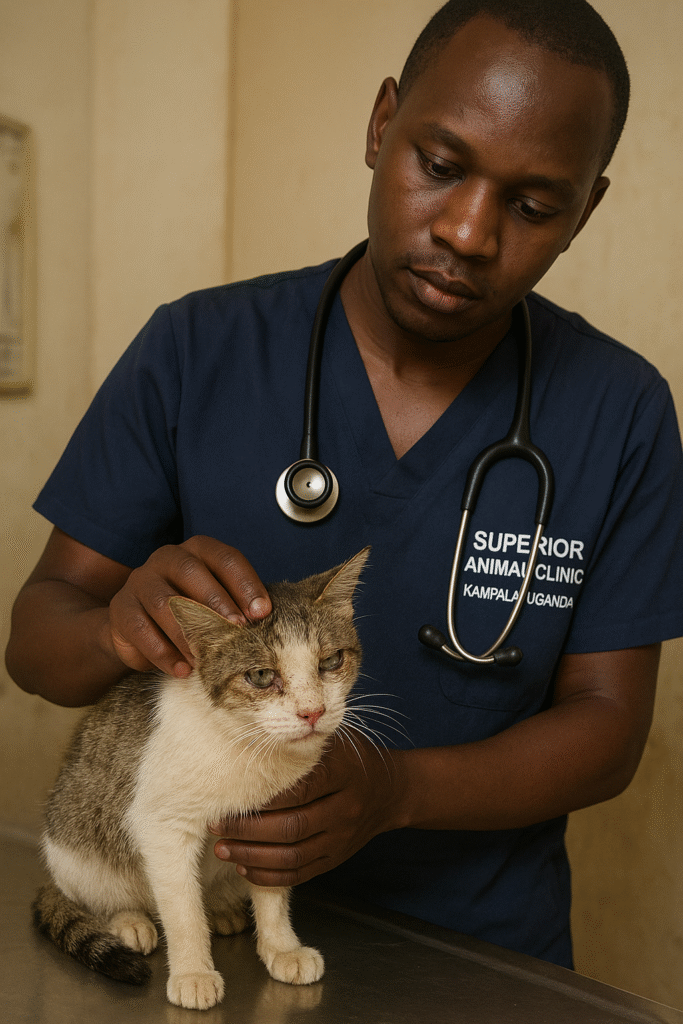
2. Parasite Infections (Worms, Fleas, Ticks, Mites)
Parasites are extremely common in Kampala’s cats, especially in neighborhoods like Nsambya, Muyenga, Bugolobi, and Nakawa, where outdoor cats roam gardens, rubbish areas, and shared compounds.
Causes
- Outdoor roaming
- Poor litter hygiene
- Contact with infected cats
Symptoms
- Scratching and skin irritation
- Hair loss and bald patches
- Worms visible in stool
- Diarrhea or vomiting
- Pale gums (from anemia)
Treatment at Superior Animal Clinic
- Deworming tablets (broad-spectrum)
- Anti-flea/tick sprays and spot-on treatments
- Injectable anti-parasitics for heavy infestations
- Vitamin supplements for recovery
Cost of Treatment
UGX 20,000 – 80,000 depending on parasite type and severity.
Home Remedies
- Neem leaf rinses for flea prevention
- Regular grooming with a fine-tooth comb
- Clean litter boxes daily
Prevention
- Monthly deworming
- Tick/flea collars
- Regular grooming and bathing
Prognosis
Untreated parasite infestations cause severe anemia, malnutrition, and stunted growth. Kittens are most at risk.
3. Feline Infectious Peritonitis (FIP)
FIP is a serious viral disease caused by a mutation of feline coronavirus. It’s more common among pedigree cats and indoor cats in Nakasero, Kololo, and Buziga, where imported breeds are kept.
Causes
- Mutation of feline coronavirus
Symptoms
- Distended belly from fluid accumulation
- Persistent fever
- Weight loss
- Difficulty breathing
- Weakness
Treatment at Superior Animal Clinic
- Supportive therapy to ease symptoms
- Antiviral drugs (in severe cases)
- Pain management and fluid drainage when needed
Cost of Treatment
UGX 200,000 – 500,000 depending on stage and duration of care.
Home Care
- Stress-free environment
- High-quality, protein-rich diet
- Regular follow-up visits
Prevention
- Keep cats indoors to reduce exposure
- Test cats before introducing them to households
Prognosis
Without treatment, FIP is almost always fatal. With early intervention, some cats improve and live longer.
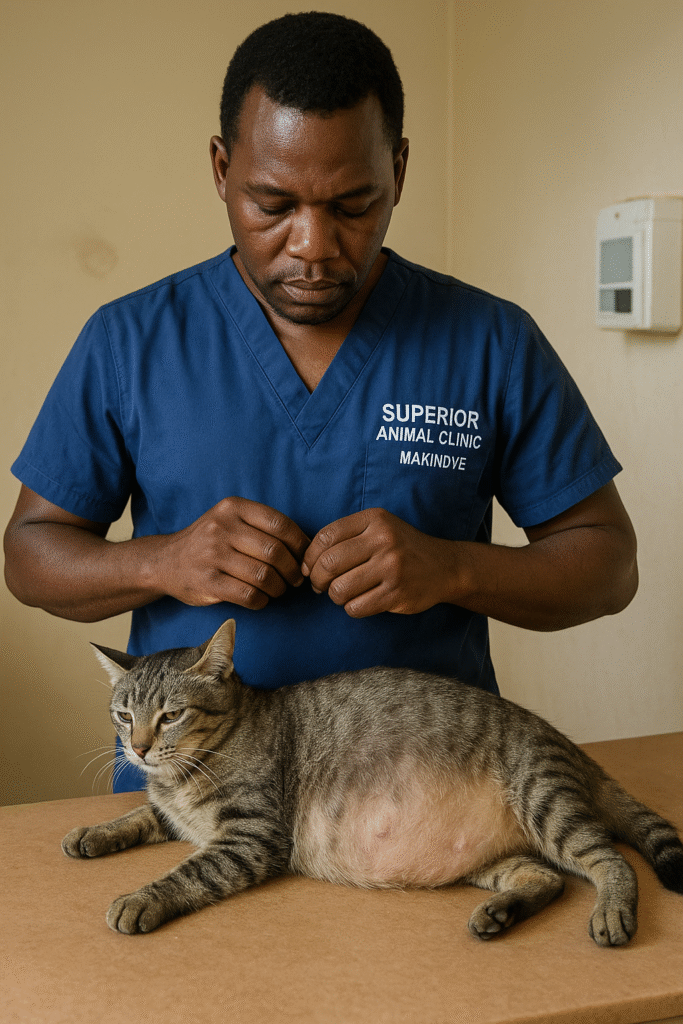
4. Skin Diseases (Ringworm, Mange, Fungal Infections)
Skin diseases are among the most visible cat problems in Kampala, especially in areas like Katwe, Kisenyi, and Kasubi, where cats roam in unhygienic conditions.
Causes
- Fungal infections (ringworm)
- Mites (mange)
- Poor grooming or malnutrition
Symptoms
- Patchy hair loss
- Scaly, crusty skin
- Redness and sores
- Constant scratching
Treatment at Superior Animal Clinic
- Antifungal creams and oral medications
- Medicated baths
- Injections for mange
- Antiseptic washes
Cost of Treatment
UGX 40,000 – 120,000 depending on severity.
Home Remedies
- Regular grooming and brushing
- Cleaning bedding with hot water
- Coconut oil for mild fungal irritation
Prevention
- Maintain good hygiene
- Keep cats indoors to avoid contact with strays
- Boost immune health with good nutrition
Prognosis
Untreated skin disease spreads to humans (zoonotic) and causes severe secondary infections.
5. Cat Dental Disease (Gingivitis & Tooth Infections)
Dental problems are common in cats in urban Kampala—especially in Naguru, Lugogo, Muyenga, and Kololo, where cats are fed processed diets.
Causes
- Plaque and tartar buildup
- Gum infections (gingivitis)
- Poor dental hygiene
Symptoms
- Bad breath
- Drooling
- Swollen, bleeding gums
- Difficulty eating
Treatment at Superior Animal Clinic
- Professional dental cleaning under anesthesia
- Antibiotics for infection
- Tooth extractions if teeth are damaged
Cost of Treatment
UGX 70,000 – 200,000.
Home Care
- Brush cat’s teeth with pet toothpaste
- Provide dental chews and toys
- Regular dental checkups
Prevention
- Routine oral care
- Annual vet dental cleaning
Prognosis
Untreated dental disease spreads bacteria to kidneys, liver, and heart, leading to life-threatening illness.
6. Feline Diabetes
Feline diabetes is becoming increasingly common among indoor and overweight cats in neighborhoods like Kololo, Naguru, Muyenga, and Bukoto, where cats often consume processed foods.
Causes
- Obesity and sedentary lifestyle
- High-carbohydrate diets
- Genetic predisposition
Symptoms
- Excessive thirst and urination
- Weight loss despite normal appetite
- Lethargy
- Sweet-smelling breath
Treatment at Superior Animal Clinic (Specific)
- Insulin therapy: Cats are given tailored insulin doses based on blood glucose monitoring.
- Dietary management: Prescription low-carb, high-protein cat food.
- Regular blood glucose testing: Either at the clinic or via a home glucometer.
- Follow-up check-ups every 2–4 weeks until stabilized.
Cost of Treatment
UGX 150,000 – 400,000 depending on insulin type, testing frequency, and follow-up care.
Home Care
- Consistent feeding times
- Strict adherence to insulin schedule
- Monitor water intake and urination
Prevention
- Maintain healthy weight
- Feed balanced, species-appropriate diet
- Encourage regular activity
Prognosis
If untreated, can cause kidney failure, nerve damage, and diabetic ketoacidosis, which can be fatal.
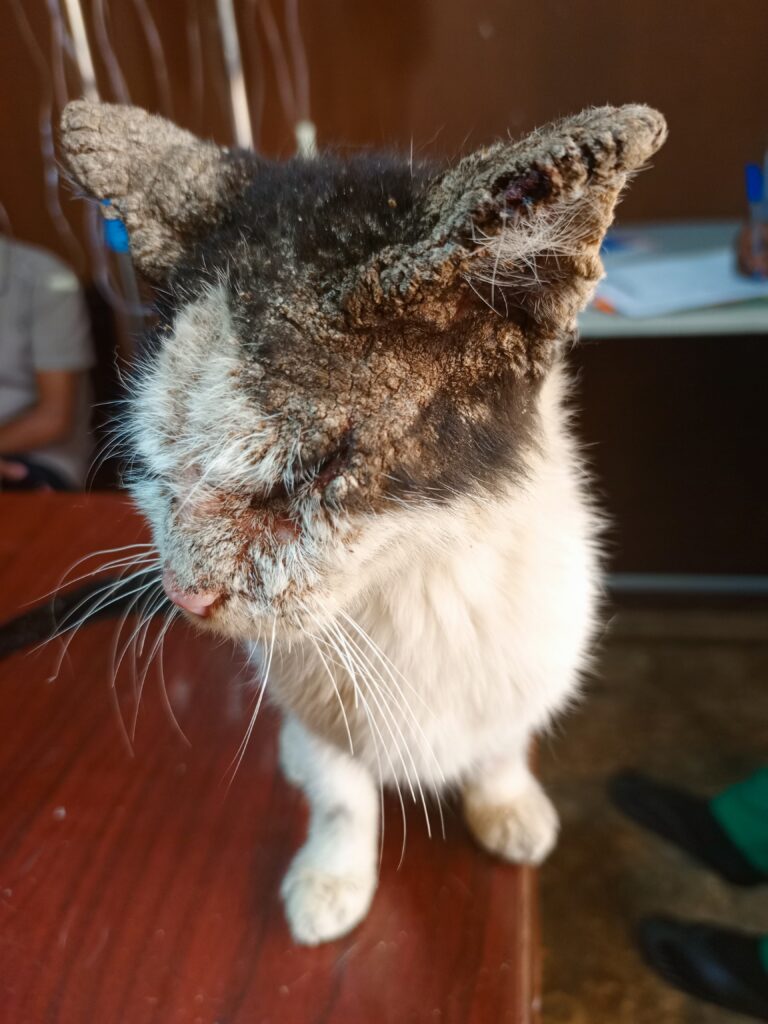
7. Feline Kidney Disease
Chronic kidney disease (CKD) is common in older cats, especially in areas like Buziga, Rubaga, and Makindye, where aging cats live indoors without proper hydration.
Causes
- Aging (most cats >7 years)
- Chronic dehydration
- High-protein diets without veterinary supervision
- Secondary to other diseases (diabetes, hypertension)
Symptoms
- Increased urination and thirst
- Weight loss
- Poor coat condition
- Vomiting and diarrhea
Treatment at Superior Animal Clinic (Specific)
- Blood and urine tests to stage the disease
- IV fluids to manage dehydration
- Prescription renal diet low in protein and phosphorus
- Medications: phosphate binders, anti-nausea drugs, blood pressure medication if needed
- Regular monitoring every 3–6 months
Cost of Treatment
UGX 100,000 – 500,000 depending on severity and tests required.
Home Care
- Fresh water available at all times
- Feeding prescription kidney-friendly food
- Monitor for vomiting or reduced appetite
Prevention
- Early detection through routine vet checkups
- Maintain hydration and proper diet
Prognosis
Untreated CKD leads to progressive kidney failure, poor quality of life, and eventual death.
8. Feline Heart Disease
Heart disease in cats, particularly hypertrophic cardiomyopathy (HCM), is increasingly diagnosed in Kololo, Nakasero, and Muyenga, where indoor cats may have undetected genetic predispositions.
Causes
- Genetic predisposition (HCM)
- High blood pressure
- Obesity
Symptoms
- Difficulty breathing
- Coughing or wheezing
- Lethargy and weakness
- Sudden collapse in severe cases
Treatment at Superior Animal Clinic (Specific)
- Echocardiogram to diagnose the type and severity
- Medications: Beta-blockers, ACE inhibitors, diuretics depending on heart function
- Regular monitoring with ECG and blood pressure checks
Cost of Treatment
UGX 200,000 – 600,000 depending on diagnostics and medications.
Home Care
- Restrict strenuous activity
- Provide a calm, stress-free environment
- Administer medications exactly as prescribed
Prevention
- Routine veterinary checkups for early detection
- Monitor weight and diet
Prognosis
Untreated, HCM can cause heart failure, blood clots, and sudden death.
9. Feline Liver Disease
Liver disease, including hepatic lipidosis, is common among overweight cats or cats with sudden anorexia in Muyenga, Naguru, and Bukoto.
Causes
- Obesity followed by sudden starvation
- Toxins (certain plants, medications)
- Infections
Symptoms
- Yellowing of eyes and gums (jaundice)
- Loss of appetite
- Vomiting
- Weight loss
Treatment at Superior Animal Clinic (Specific)
- Blood tests to assess liver function
- IV fluids and electrolytes to correct dehydration and imbalances
- Medications: anti-nausea, liver support supplements
- Feeding tube in severe cases to provide adequate nutrition
- Hospitalization for monitoring in critical cases
Cost of Treatment
UGX 150,000 – 500,000 depending on severity and hospitalization duration.
Home Care
- Strict diet as prescribed by vet
- Monitor for vomiting or jaundice
- Ensure access to fresh water
Prevention
- Avoid sudden fasting
- Limit exposure to toxins
- Regular health checkups
Prognosis
If untreated, hepatic lipidosis can lead to liver failure and death, especially in overweight cats.
10. Feline Panleukopenia (Cat Distemper)
Highly contagious and potentially fatal, this disease is most common in kittens and unvaccinated cats in Old Kampala, Kasubi, Katwe, and Nsambya.
Causes
- Feline parvovirus infection
Symptoms
- Sudden vomiting and diarrhea
- Severe dehydration
- Fever and lethargy
- Loss of appetite
Treatment at Superior Animal Clinic (Specific)
- Isolation to prevent spread
- IV fluids for dehydration
- Antibiotics to prevent secondary infections
- Nutritional support and anti-nausea medication
- Close hospital monitoring
Cost of Treatment
UGX 100,000 – 300,000, depending on hospitalization duration.
Home Care
- Strict hygiene to prevent spread
- Supportive care if mild and treated at home under vet supervision
Prevention
- Vaccination at 8–12 weeks and booster doses
- Avoid contact with unvaccinated cats
Prognosis
Without treatment, mortality rate is extremely high, especially in kittens.
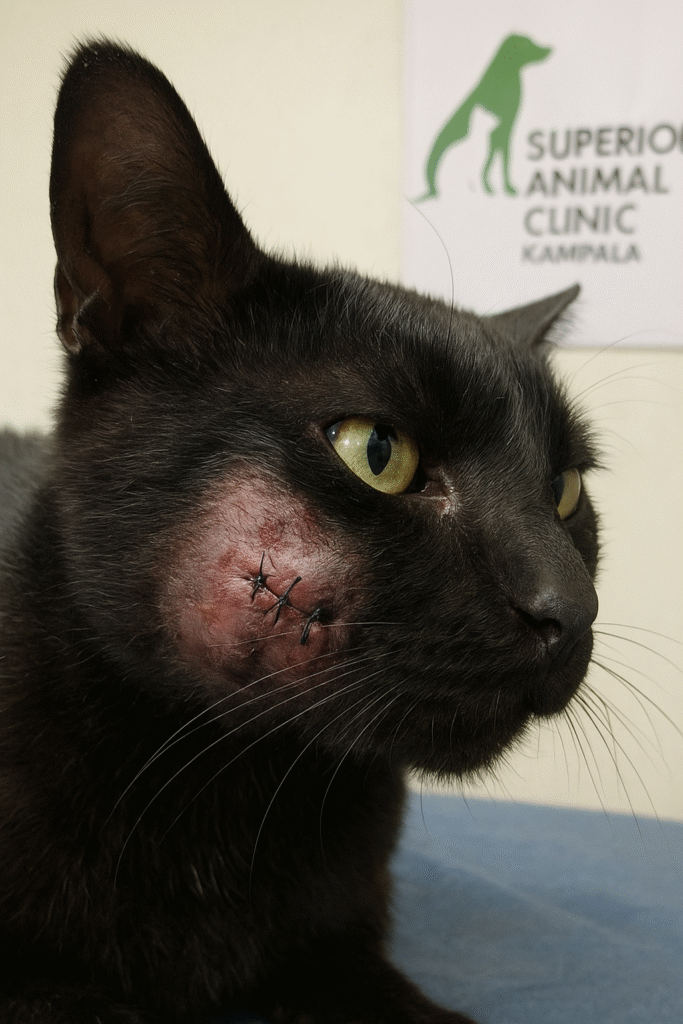
11. Kidney Infections (Pyelonephritis)
Kidney infections, or pyelonephritis, are serious conditions that can affect cats in Kampala, especially in areas like Buziga, Munyonyo, and Rubaga, where cats may have limited access to clean water or are exposed to environmental toxins.
Causes
- Ascending bacterial infections from the urinary tract
- Underlying conditions like diabetes or kidney stones
Symptoms
- Fever
- Vomiting
- Lethargy
- Increased thirst and urination
Treatment at Superior Animal Clinic
- Antibiotic therapy: Typically administered for 4–6 weeks, based on urine culture results to ensure the appropriate antibiotic is used.
- IV fluids: To address dehydration and support kidney function.
- Pain management: Analgesics to alleviate discomfort.
- Hospitalization: In severe cases, for close monitoring and supportive care.
Cost of Treatment
Approximately UGX 200,000 – 600,000, depending on the severity and required interventions.
Home Care
- Administer prescribed medications as directed.
- Ensure access to fresh water at all times.
- Monitor for any changes in behavior or litter box habits.
Prevention
- Regular veterinary check-ups to detect early signs.
- Maintain a clean and stress-free environment.
- Address underlying health issues promptly.
Prognosis
With timely and appropriate treatment, many cats recover fully. However, untreated kidney infections can lead to kidney failure and be life-threatening.
12. Eye Infections (Conjunctivitis)
Eye infections are common in cats across Kampala, particularly in Old Kampala, Nsambya, and Katwe, where overcrowding and limited veterinary access may contribute to the spread of infections.
Causes
- Bacterial or viral infections
- Allergies
- Foreign bodies or trauma
Symptoms
- Redness or swelling of the eyes
- Discharge (clear, yellow, or green)
- Squinting or excessive blinking
- Pawing at the eyes
Treatment at Superior Animal Clinic
- Antibiotic eye ointments: Such as tetracycline or chloramphenicol, to combat bacterial infections.
- Anti-inflammatory medications: To reduce swelling and discomfort.
- Warm compresses: To soothe the eyes and promote drainage.
- Regular cleaning: Gently wiping away discharge with a clean, damp cloth.
Cost of Treatment
Approximately UGX 50,000 – 150,000, depending on the severity and required medications.
Home Care
- Apply prescribed eye ointments as directed.
- Keep the cat indoors to prevent further irritation.
- Maintain a clean environment to reduce exposure to allergens or irritants.
Prevention
- Regular eye check-ups, especially for breeds prone to eye issues.
- Promptly address any signs of eye discomfort.
- Maintain a clean living environment to minimize allergens.
Prognosis
Most cats recover fully with appropriate treatment. However, chronic or untreated eye infections can lead to vision impairment.
13. Feline Leukemia Virus (FeLV)
Feline Leukemia Virus (FeLV) is a significant concern for cats in Kampala, particularly in Kasubi, Nakasero, and Kololo, where outdoor access and interactions with other cats increase the risk of transmission.
Causes
- Transmission through saliva, nasal secretions, urine, feces, and milk
- Bite wounds or mutual grooming
Symptoms
- Weight loss
- Pale gums
- Fever
- Swollen lymph nodes
- Respiratory or digestive issues
Treatment at Superior Animal Clinic
- Supportive care: Including fluid therapy and nutritional support.
- Antiviral medications: Such as interferons, to manage symptoms.
- Regular monitoring: Blood tests to assess immune function and organ health.
Cost of Treatment
Approximately UGX 300,000 – 800,000, depending on the severity and required interventions.
Home Care
- Provide a stress-free environment.
- Ensure a balanced diet and regular feeding schedule.
- Monitor for any changes in behavior or health status.
Prevention
- Vaccination: Available for cats at risk of exposure.
- Indoor confinement: To reduce exposure to infected cats.
- Regular veterinary check-ups: For early detection and management.
Prognosis
FeLV-positive cats can live for years with appropriate care, but the virus can lead to secondary infections and cancers, potentially shortening lifespan.
14. Urinary Tract Infections (UTIs)
Urinary Tract Infections (UTIs) are prevalent in cats across Kampala, especially in Nakawa, Bugolobi, and Muyenga, where environmental stressors and dietary factors may contribute to urinary issues.
Causes
- Bacterial infections
- Bladder stones or crystals
- Stress or behavioral changes
Symptoms
- Frequent urination
- Straining to urinate
- Blood in the urine
- Licking the genital area excessively
Treatment at Superior Animal Clinic
- Antibiotic therapy: Based on urine culture results to target the specific bacteria.
- Pain relief: Medications to alleviate discomfort.
- Dietary changes: Prescription diets to promote urinary tract health.
- In severe cases: Hospitalization for IV fluids and monitoring.
Cost of Treatment
Approximately UGX 100,000 – 300,000, depending on the severity and required interventions.
Home Care
- Provide fresh water at all times to encourage hydration.
- Monitor litter box habits and report any changes to the veterinarian.
- Follow dietary recommendations to support urinary health.
Prevention
- Regular veterinary check-ups to detect early signs.
- Maintain a clean and stress-free environment.
- Address underlying health issues promptly.
Prognosis
With appropriate treatment, most cats recover fully. However, recurrent UTIs may indicate underlying health issues that require ongoing management.
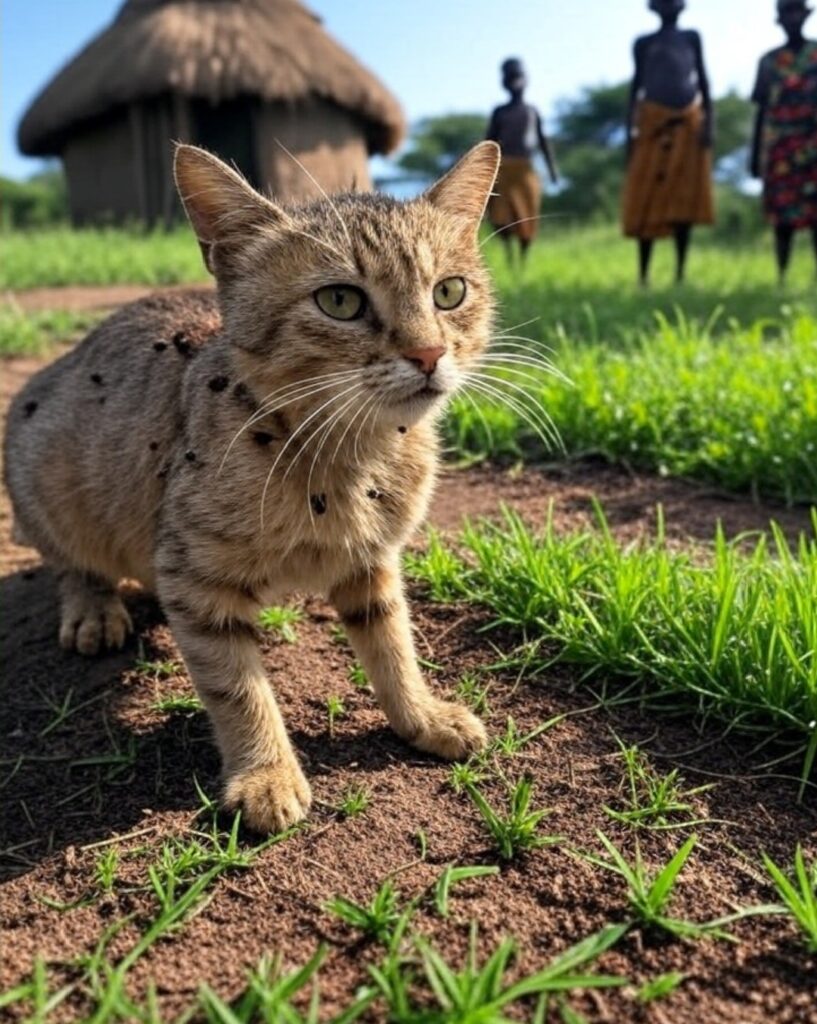
15. Obesity-Related Complications
Obesity is a growing concern among cats in Kampala, particularly in Lugogo, Lubowa, and Seguku, where indoor lifestyles and overfeeding contribute to weight gain.
Causes
- Overfeeding and lack of exercise
- High-calorie diets
- Neutering or spaying leading to decreased metabolic rate
Symptoms
- Noticeable weight gain
- Difficulty grooming
- Lethargy
- Joint problems
Treatment at Superior Animal Clinic
- Weight management plans: Tailored dietary and exercise programs.
- Nutritional counseling: To ensure a balanced diet.
- Regular monitoring: To track weight loss progress and adjust plans as needed.
Cost of Treatment
Approximately UGX 50,000 – 150,000, depending on the complexity of the weight management plan.
Home Care
- Provide portion-controlled meals.
- Encourage play and physical activity.
- Monitor weight regularly and adjust diet and exercise accordingly.
Prevention
- Regular feeding schedules with appropriate portion sizes.
- Encourage active play and exercise.
- Regular veterinary check-ups to monitor weight and health status.
Prognosis
With commitment to a weight management plan, many cats can achieve a healthy weight, reducing the risk of associated health issues like diabetes and joint problems.
FAQs – Cat Diseases in Kampala
Q1. What are the most common cat diseases in Kampala?
The most common cat diseases in Kampala include cat flu, parasites (worms, fleas, ticks, mites), FIP, kidney infections, eye infections, dental disease, feline leukemia, urinary tract infections, and obesity-related complications. Areas like Old Kampala, Katwe, Muyenga, Bugolobi, Kololo, and Nakasero report higher cases due to stray cats, indoor living conditions, and diet.
Q2. How much does it cost to treat a sick cat in Kampala?
Treatment costs vary by disease and severity. For example:
- Cat flu: UGX 50,000 – 150,000
- Parasite infestations: UGX 20,000 – 80,000
- FIP: UGX 200,000 – 500,000
- Kidney infections: UGX 200,000 – 600,000
- Feline leukemia care: UGX 300,000 – 800,000
Superior Animal Clinic offers transparent pricing and customized treatment plans.
Q3. Can indoor cats in Kampala still get sick?
Yes. Indoor cats can still get illnesses like cat flu, dental disease, kidney issues, and obesity-related complications, especially if they are not regularly vaccinated, dewormed, or monitored for diet and hydration.
Q4. How can I prevent my cat from getting sick in Kampala?
- Vaccination: Protects against cat flu, FIP, and feline leukemia.
- Regular vet check-ups: Detect early signs of illness.
- Parasite control: Monthly deworming and flea/tick prevention.
- Healthy diet and exercise: Prevent obesity, diabetes, and urinary problems.
- Clean environment: Reduces exposure to bacteria and viruses.
Q5. Where can I find the best cat vet near me in Kampala?
For expert feline care in Ntinda, Old Kampala, Kasubi, Nsambya, Katwe, Zana, Nakasero, Mityana, Makindye, Buziga, Munyonyo, Nakawa, Rubaga, Muyenga, Naguru, Bugolobi, Kabowa, Kabojja, Lugogo, Lubowa, Seguku, Ndejje, Kololo, Mutundwe, Bukoto, Bulindo, and Kulambiro, Superior Animal Clinic Makindye is the top-rated veterinary clinic for cats in Kampala, offering emergency care, disease prevention, and advanced treatment options.
Q6. How do I know if my cat has cat flu or another disease?
Common signs include:
- Sneezing and coughing
- Watery eyes or nasal discharge
- Loss of appetite
- Lethargy or unusual behavior
Early consultation at Superior Animal Clinic ensures proper diagnosis and treatment.
Q7. What should I do if my cat has parasites?
Bring your cat to Superior Animal Clinic for:
- Deworming tablets
- Flea and tick treatment
- Injectable anti-parasitics for severe cases
- Nutritional support for recovery
Q8. Can cats recover from FIP or feline leukemia?
- FIP: Prognosis is poor without treatment, but supportive care and antivirals at Superior Animal Clinic can improve comfort and quality of life.
- Feline leukemia (FeLV): While not curable, early detection, supportive care, and indoor management help infected cats live longer and healthier lives.
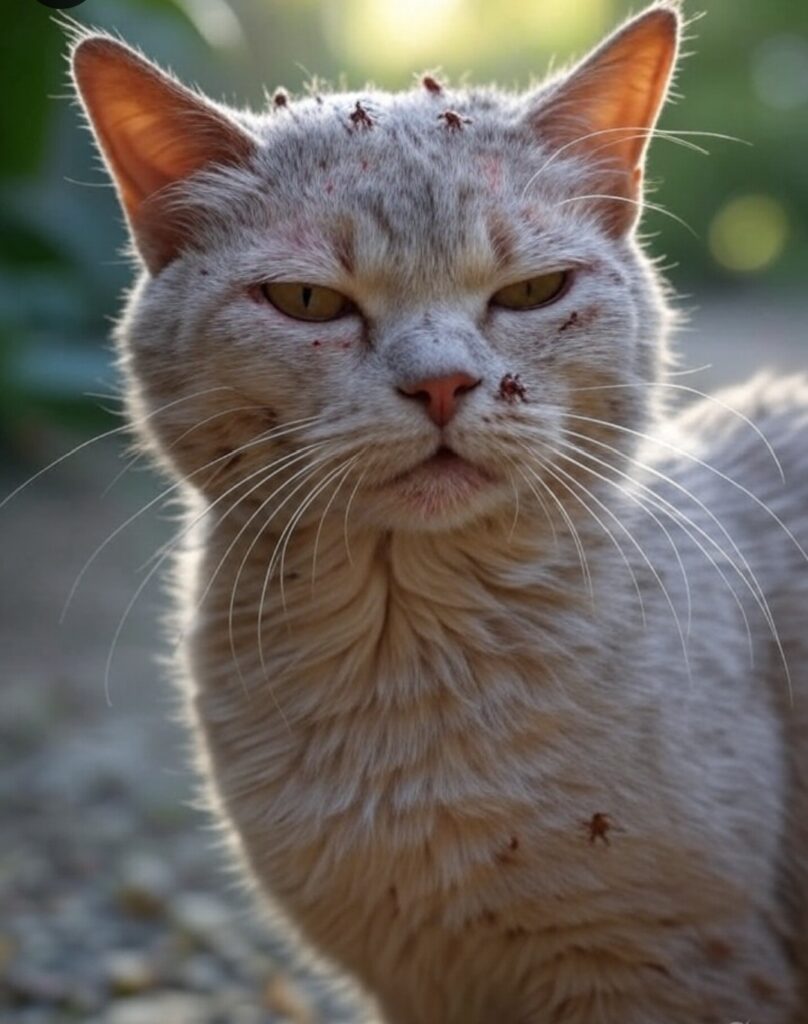
Q9. How do I prevent urinary tract infections in my cat in Kampala?
- Provide fresh, clean water at all times
- Feed a urinary-friendly diet recommended by a vet
- Reduce stress in the home environment
- Bring your cat for regular check-ups at Superior Animal Clinic
Q10. Are obesity-related complications common in Kampala cats?
Yes, especially in indoor cats in Lugogo, Lubowa, Seguku, Muyenga, and Kololo. Overfeeding, lack of exercise, and poor diet contribute to obesity, which can lead to diabetes, joint problems, and heart disease. Superior Animal Clinic provides weight management programs for cats.
Q11. How quickly should I take my cat to the vet if it’s sick?
Cats can hide illnesses until they become severe. Immediate veterinary care is recommended if your cat shows:
- Persistent vomiting or diarrhea
- Difficulty breathing
- Sudden lethargy
- Loss of appetite
- Visible parasites or skin lesions
Q12. Does Superior Animal Clinic offer home remedies for minor cat illnesses?
Yes, we guide cat owners on safe, locally available home care options for mild conditions like minor digestive upset or mild skin irritation. However, all serious illnesses require professional treatment at our clinic.
Q13. Are kittens more vulnerable to diseases in Kampala?
Yes, kittens are highly susceptible to cat flu, parasites, FIP, and feline leukemia, especially in crowded areas like Kasubi, Katwe, and Old Kampala. Early vaccination, deworming, and regular check-ups at Superior Animal Clinic are essential.
Q14. Why choose Superior Animal Clinic for cat care in Kampala?
- Expert veterinarians specializing in feline medicine
- Advanced diagnostic and treatment facilities
- Transparent pricing for all treatments
- Serving all major neighborhoods in Kampala
- Focus on prevention, early detection, and long-term cat health
Q15. How can I keep my cat healthy long-term in Kampala?
- Schedule regular vet check-ups every 6–12 months
- Maintain vaccination and parasite control schedules
- Feed a balanced diet and provide adequate exercise
- Monitor for early signs of illness
- Consult Superior Animal Clinic Makindye for personalized health plans
Q16. How often should I vaccinate my cat in Kampala?
Cats in Kampala should receive core vaccinations for cat flu, feline panleukopenia, and feline leukemia starting from 8–12 weeks of age, with boosters every 1–3 years depending on the vaccine. Superior Animal Clinic provides complete vaccination schedules for cats across Ntinda, Old Kampala, Makindye, Kololo, and Muyenga.
Q17. What signs indicate my cat has a serious illness?
Serious illness signs include:
- Persistent vomiting or diarrhea
- Difficulty breathing
- Sudden weight loss
- Lethargy or weakness
- Swelling or lumps
- Bloody urine
Immediate veterinary care at Superior Animal Clinic Makindye is recommended for these symptoms.
Q18. Are stray cats in Kampala more prone to diseases?
Yes. Stray cats, especially in areas like Katwe, Kasubi, Old Kampala, and Nakasero, are at higher risk of parasites, feline leukemia, FIP, and respiratory infections due to poor nutrition, overcrowding, and lack of vaccination.
Q19. Can cats in Kampala get diabetes?
Yes, diabetes is increasingly common in overweight or indoor cats in Kololo, Bukoto, Muyenga, and Lugogo. Symptoms include excessive thirst, frequent urination, weight loss, and lethargy. Early detection and insulin therapy at Superior Animal Clinic can help manage the condition effectively.
Q20. What home care can I provide for a sick cat in Kampala?
- Ensure access to clean water and nutritious food
- Keep the environment stress-free and hygienic
- Administer vet-prescribed medications on schedule
- Monitor symptoms and report changes promptly to Superior Animal Clinic Makindye
Q21. How do I know which parasite treatment is right for my cat?
The type of parasite and severity determine the treatment. Superior Animal Clinic conducts fecal tests and physical exams to prescribe:
- Deworming tablets for intestinal worms
- Flea and tick topical or injectable treatments
- Preventive monthly medications
Q22. Can indoor cats in Kampala still get urinary tract infections?
Yes. Indoor cats, particularly in Muyenga, Naguru, and Lubowa, can develop UTIs due to stress, dehydration, or diet. Early signs include straining to urinate, blood in urine, and frequent trips to the litter box. Veterinary treatment at Superior Animal Clinic ensures full recovery.
Q23. How can I prevent obesity in my cat?
- Feed portion-controlled, balanced diets
- Encourage daily play and exercise
- Monitor weight monthly
- Avoid overfeeding treats
Superior Animal Clinic provides customized weight management programs for cats in Kampala.
Q24. How long can a cat live with chronic kidney disease?
With proper treatment including IV fluids, prescription renal diets, and regular monitoring at Superior Animal Clinic, cats with chronic kidney disease can live 1–3 years or longer, depending on early detection and severity.
Q25. Can Superior Animal Clinic treat emergency cat illnesses in Kampala?
Yes. We provide 24/7 emergency care for conditions such as FIP, severe vomiting, dehydration, injuries, and poisoning. Cats from Ntinda, Makindye, Kololo, Rubaga, and other neighborhoods can receive immediate attention at our clinic.
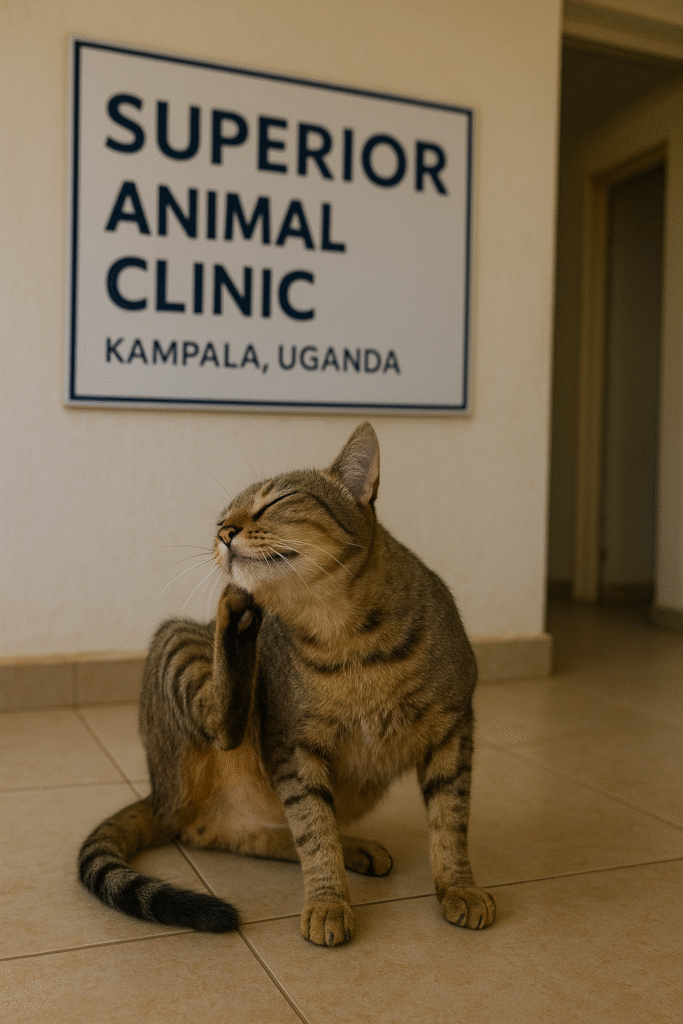
Q26. Do cats in Kampala need regular dental check-ups?
Absolutely. Dental issues like tartar buildup, gingivitis, and tooth decay are common in cats across Bukoto, Muyenga, Lugogo, and Old Kampala. Regular dental cleanings and exams at Superior Animal Clinic prevent infections and improve overall health.
Q27. How do I find a reliable cat vet in my neighborhood?
Search for vets that offer:
- Comprehensive diagnostics and treatments
- Vaccination, parasite control, and emergency care
- Positive reviews from local cat owners
Superior Animal Clinic Makindye serves all neighborhoods in and around Kampala and is trusted for feline health care.
Q28. Can cats recover fully from eye infections?
Yes. With proper treatment at Superior Animal Clinic, including antibiotic ointments, anti-inflammatories, and supportive care, most cats in Kampala fully recover from eye infections like conjunctivitis.
Q29. How can I reduce my cat’s risk of FIP in Kampala?
- Avoid overcrowded environments for kittens
- Practice proper hygiene and litter box cleaning
- Vaccinate where recommended
- Early vet check-ups at Superior Animal Clinic help detect risks early
Q30. Are there safe home remedies for minor cat illnesses in Kampala?
Yes, for minor digestive or skin issues, safe remedies include:
- Plain, easily digestible food
- Warm compresses for minor wounds or eye irritation
- Monitoring hydration
However, all serious illnesses require veterinary attention at Superior Animal Clinic.
Why Superior Animal Clinic is the Best Choice for Cat Treatment in Kampala
- Experienced veterinarians specializing in cat care
- 24/7 emergency services in Makindye
- Affordable and transparent pricing
- Serving all Kampala neighborhoods and beyond
- Focus on prevention, treatment, and long-term health
Whether your cat has flu, parasites, skin disease, dental issues, or serious conditions like FIP, Superior Animal Clinic is the trusted veterinary clinic for cat owners in Kampala and Uganda.
Conclusion
Understanding and addressing these common cat diseases in Kampala is crucial for ensuring the health and well-being of your feline companion. At Superior Animal Clinic, located in Makindye along Salaama Road, we are dedicated to providing comprehensive veterinary care tailored to the unique needs of cats in Kampala.
Whether you’re dealing with kidney infections, eye issues, FeLV, UTIs, or obesity-related complications, our experienced team is here to help. We offer personalized treatment plans, preventive care, and ongoing support to ensure your cat lives a long, healthy, and happy life.
If you’re searching for a trusted veterinary clinic in Kampala, look no further than Superior Animal Clinic. Contact us today to schedule an appointment and give your cat the care they deserve.
✅ If your cat is sick, weak, or showing unusual behavior, don’t wait. Visit Superior Animal Clinic today. Early treatment saves lives.

Okay, swete99 is kinda lowkey, but I fuck with it. It’s got this simple appeal that’s oddly addicting. Plus not a lot of adds which is a major win in my book.